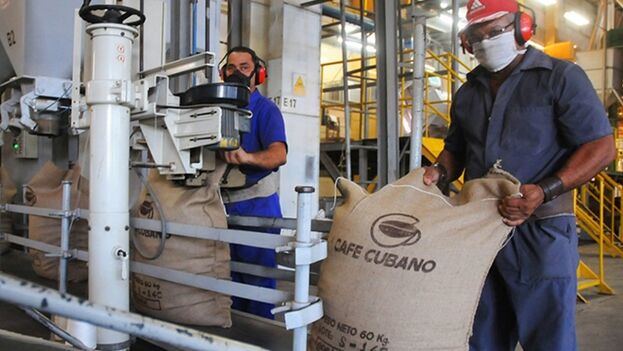
![]() 14ymedio, Havana, 7 February 2023 — Cuba is on a crusade to increase the productivity of its coffee with the renovation of 316,295 acres, of which 67% will be for the cultivation of Robusta, a bean that has less demand in specialized markets and that is bought at a lower price than the soft and sweet Arabica. However, even the Cuban aromatic cannot compete with its Caribbean peers with a production that has been reduced by more than half in the last 30 years.
14ymedio, Havana, 7 February 2023 — Cuba is on a crusade to increase the productivity of its coffee with the renovation of 316,295 acres, of which 67% will be for the cultivation of Robusta, a bean that has less demand in specialized markets and that is bought at a lower price than the soft and sweet Arabica. However, even the Cuban aromatic cannot compete with its Caribbean peers with a production that has been reduced by more than half in the last 30 years.
Felipe Martínez Suárez, director of the Agroforestry Experimental Station, located in the mountainous municipality of Tercer Frente, in Santiago de Cuba, explained to the official newspaper Granma that a team of researchers is working on the recovery of 46,950 acres of Robusta and another 22,240 acres of Arabica. The official explained that it is not about new crops, but about “rectifying the coffee” with the pruning of young branches, changing the canopies and reseeding only when necessary.
The projection is optimistic, he added, and he plans to obtain 25,600 tons of coffee with these measures, two tons for each acre cultivated in the province, which has the highest production nationwide. “We have four years to do all that; otherwise we will not have the amount needed in the country by 2030,” he said.
Coffee activity is mainly carried out in nine provinces: Santiago de Cuba, Guantánamo and Granma represent 90% of national production; in the central region. Sancti Spíritus, Cienfuegos and Villa Clara contribute 7%; and in the west, Artemisa and Pinar de Río provide the remaining 3%.
Martínez Suárez explained that the coffee development program does not seek to expand the cultivation areas, but to increase yields and improve the infrastructure that currently allows four tons per hectare of Robusta coffee and 2.79 tons of Arabica. “Innovations” such as the use of biotechnology are also required, preventing the planting of new beans and grafts in the field.
Cuba recorded its best harvest in 1961, when it reached 60,330 tons of gold coffee, but since then production has been decreasing, to the point that in the 1970s and 1980s it was reduced by almost two-thirds and placed at 21,863 tons. The decline of the sector continued in the 90s and the 21st century, and by 2021 it barely reached 8,900 tons.
With this production, the Island falls below its peers in the Caribbean. According to the International Coffee Organization (OIC), Cuba obtained 130,000 sacks of coffee (of 132 pounds) in the 2019/2020 harvest while producers in the Dominican Republic reported 402,000 sacks and Haiti, a country with great problems of food insecurity, produced 347,000 sacks.
The production of the Cuban aromatic of the 2019/20 cycle was the highest since the 2008/2009 harvest, when 133,000 sacks were produced. The result, however, is 3.1 times lower compared to the 414,000 sacks obtained in the 1990/1991 cycle, the last year available in the OIC database.
In other words, Cuban coffee production has fallen by 68.5% in the last three decades.
Martínez Suárez acknowledged that the harvest is insufficient to meet domestic demand, and a “million-dollar amount” is allocated for import, so, he promised, “significant volumes” will be allocated from the new production for social consumption and distribution in freely convertible currency stores.
According to their projections, 14,000 tons of the bean will be for the regulated (rationed) consumption of Cuban families, 5,000 for export and 2,000 tons for the cafes of the gastronomic network.
These results are conditional on the sector being able to obtain agricultural inputs to nourish plants, such as biostimulant and fertilizers, the official added. “While they do not reach all the required volume, growth will be more effective with cultural attention,” he said.
Translated by Regina Anavy
____________
COLLABORATE WITH OUR WORK: The 14ymedio team is committed to practicing serious journalism that reflects Cuba’s reality in all its depth. Thank you for joining us on this long journey. We invite you to continue supporting us by becoming a member of 14ymedio now. Together we can continue transforming journalism in Cuba.
